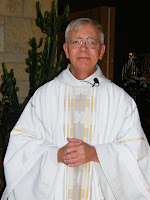
Tom Ehrich is an Episcopal priest who writes a syndicated column that appears in the Indy Star. His entry for Saturday, Dec. 12 caught my attention. He writes: "I took my sister on a seven-mile walk through Manhattan. We talked about marriage. We also talked about marital failures. Discovery of adultery evokes the sad realization that we live in immoral times. None of the ten commandments remains widely in force. Graven images are common. The Sabbath is now a prime day for shopping and soccer. Murder has been carefully defined to allow the extensive taking of life. Covetousness is the heartbeat of modern advertising. The problem is that real immorality hurts real people. At the level of an actual marriage adultery can be devastating. Real greed hurts real people. Real coveting hurts real people. Real theft hurts real people." (p. A19) In such a world you have to wonder if there’s any real reason to live by faith and the moral life that the Christian message calls us to.
The celebration of the birth of Christ and the symbol of the Love of God that the Christ-child brings into the world are being progressively eliminated from the consciousness of modern Western society. What reason is there for hope that the Christian message will be heard in our day? Why should we make this message the foundation of our lives when so many pay it no heed at all? Let’s pause to consider the evangelist John and the context of his gospel message.
The Evangelist John wrote his gospel around the year AD100. He boldly proclaims: Jesus is the Word of God; Jesus is the true Light of the world; Jesus shows God’s Glory; Jesus is the Love of God made visible to us. Into what kind of world did he bring this message of the gospel? By the year AD100 it had been 75 years (2 generations) since Jesus proclaimed his message of the Kingdom of God in our midst. It had been fifty years since Paul had preached his gospel of passion and resurrection as the focal point of everything. What had happened to the followers of Jesus in the fifty years since then? John had seen most of the immediate followers of Jesus put to death for their belief in Him. The small group of Christian believers had been evicted from the larger Jewish world, out of which they had come. The Jewish people had almost been destroyed by the military might of Rome and the city of Jerusalem and the Holy Temple had been completely demolished. Little groups of Christians in the larger Roman world fared no better. Christians had been killed by the emperor Nero by particularly horrific means of execution. By the year AD100 John would also have seen the beginning of bitter splits in the Christian movement, splits that already seemed irreconcilable. The Christian world, as John looked at it around AD100, didn’t seem to have much of a future.
Yet into this dismal world John boldly proclaims: Jesus is the Word of God; Jesus is the true Light of the world; Jesus shows God’s Glory; Jesus is the Love of God made visible to us. It made no difference to him what the larger world was made of; he acknowledged that "the world did not recognize him. His own people received him not." He still had to say, and say strongly, "Jesus is the Love of God shown to us" and He is the ultimate meaning of everything.
This Christmas the only time and the only place that matter are right here and right now. Jesus is the Love of God made visible to us. It is for us to respond to that love with a love of our own. That’s all that matters this Christmas Day.
Friday, December 25, 2009
Fr. Matthias Neuman's Christmas Homily
Subscribe to:
Post Comments (Atom)




No comments:
Post a Comment